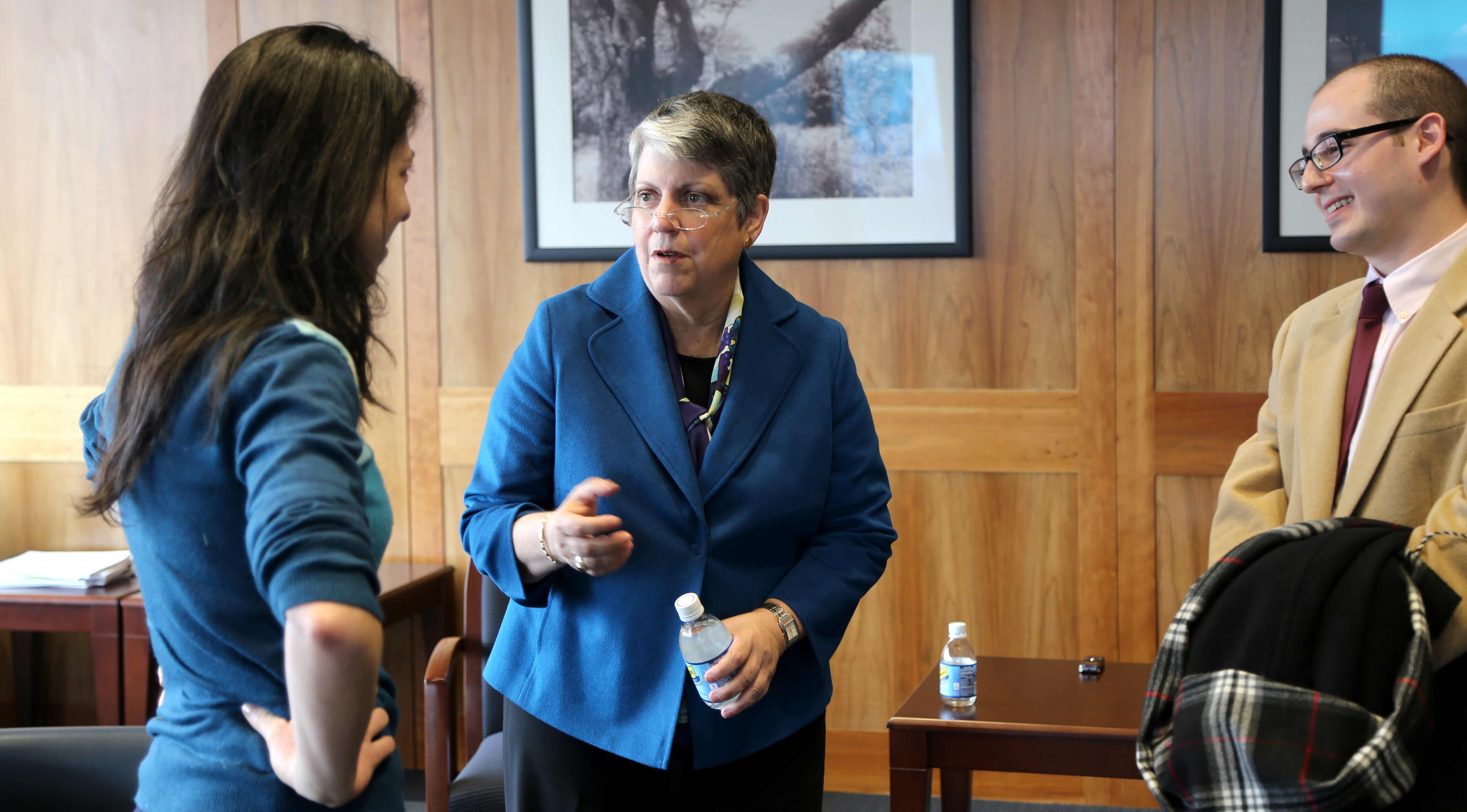Janet Napolitano – president of the University of California and former Department of Homeland Security Secretary, and one of the University of Virginia School of Law’s most prominent alumni – returned to North Grounds on Tuesday to extol working in public service and the value of a law degree.
“You’ve got to have a passion for it,” Napolitano said of taking on high-profile public service roles. “You don’t just snap your fingers and get these careers. … You’ve really got to work it.”
Napolitano participated in a question-and-answer session with about 50 students in the Law School’s “Law and Public Service” class. She was in Charlottesville to speak at the Virginia Law Review’s annual dinner Tuesday night.
Napolitano was the first female governor to succeed another female governor of Arizona. She began her career in private practice after a clerkship, rising to the level of partner before President Bill Clinton appointed her as a U.S. attorney.
She left office during her second term as governor to serve as the fourth head of Homeland Security, the third-largest department in the federal government, from 2009 to 2013. She then signed on to lead the University of California system, the largest public research university in the world.
“I knew even as I went into private practice that at some point in my career I wanted to be in public service,” she said. “The way I look at it is, you’re put on the earth for a reason and you’re put on the earth to make a positive difference somewhere, somehow, for someone other than yourself.”
Napolitano recounted her time at Homeland Security as one that presented substantial organizational and management challenges because of the size and newness of the agency, in addition to the controversial issues the department was designed to address.
“The congressional restraints are real, the partisan gridlock is real, living under threat of [federal government] shutdown, which DHS is doing now, is real,” she said.
The skills she acquired in law school – learning how to read and digest a lot of information, identifying issues, organizing material and understanding different ways of looking at issues – proved useful to her many roles over the years.
“I actually think legal training is the best possible training for a lot of these jobs, for a lot of reasons,” said Napolitano, who earned her law degree in 1983 and was awarded the Thomas Jefferson Foundation Medal in Law in 2010.
Napolitano urged students looking to launch public service careers after first working at a firm to ask questions of their potential employers, including checking into what careers partners have left for and making sure the billable hour expectations left time for volunteer work.
“I made sure when I was interviewing with law firms that they had that tradition,” she said.
Napolitano also praised the critical role of mentors in any lawyer’s career. Her own mentors included the judge she clerked for after law school, Mary M. Schroeder of the Ninth U.S. Circuit Court of Appeals, and a partner with her then-employer, law firm Lewis & Roca.
“You want to look for somebody who will open doors for you,” she said. At law firms, a good mentor will help you gain experience conducting depositions, arguing motions and meeting clients – not just working in the background.
When a distressed Napolitano called a mentor after reading negative press at the time of her confirmation hearing for U.S. attorney, the partner told her simply, “If you want this career, deal with it,” she recalled.
“And he gave me no sympathy whatsoever, not one second of sympathy. And you know what? That was a good tough-love moment,” she said.
It turned out to be advice she used throughout the course of her career.
“The kinds of jobs I have require a very thick skin,” she said. “You have to develop that capacity to compartmentalize and brush them off and move on.”
She said one of the accomplishments for which she is most proud is a policy the Obama administration executed under her watch as Homeland Security secretary: Deferred Action for Childhood Arrivals, commonly known as DACA.
The policy allows undocumented immigrants who entered the country under age 16 and before June 2007 to receive a renewable two-year work permit and exemption from deportation. Napolitano said her time as Arizona governor gave her insight to the challenges facing the country’s borders as well as immigrants’ concerns. At Homeland Security, she pushed to expand an initial proposal that only covered students already in removal proceedings.
As a result of DACA, “There are almost 700,000 kids in the United States who don’t have to look over their shoulder every day, and that took a lot of work by the lawyers in our shop,” she said.
Asked about the challenges facing women in high-profile public service roles, Napolitano said for many women, having both a career and family life can be difficult.
“There are choices there and trade-offs to be made that are intensely personal,” she said.
There were times in the Situation Room, such as when State Department Secretary Hillary Clinton was out of the country, when Napolitano was the only female “principal” sitting at the main table, Napolitano said.
“How you set public policy and how you establish priorities is partially determined by what you think is important, and what you think is important is influenced enormously by your own experiences and the aperture through which you see the world,” she said. “Because not enough women are in public life, we don’t get that experiential base and aperture expressed often enough, and if it is, too often it’s on an issue that gets marginalized as a women’s issue.”
She added that despite the low numbers of women in elected office, when women run, they succeed at the same rates as men, both in winning and fund-raising.
“You can’t win if you don’t run,” she said.
Media Contact
Article Information
February 11, 2015
/content/law-alumna-janet-napolitano-returns-reflect-value-public-service

